Chat Pile Masks b/w Sifting 7″ (Sub Pop)

The youth may not understand that it was once a thrilling honor to release a stand-alone seven-inch single on Sub Pop, but Chat Pile has not forgotten this! Most record shops don’t even have a box for new singles these days (a single tear rolls down a bald eagle’s cheek), but Chat Pile are hotter than jalapeños right now, with a hungry audience ready to follow, so if there’s ever a time for them to do this, it’s now. “Masks” behaves how you’d expect a noisy, sardonic, post-hardcore noise-rock band on Sub Pop to behave: a nostalgia rush with thoughts of Tad, The Fluid and Unsane. Unlike much of Chat Pile’s most recent output, it’s upbeat and you can bounce to it, coasting on a busy bass-line, big ugly tom-heavy drumming and a guitar that prefers needling single-notes over power chords. The final moments offer the cathartic breakdown we’ve come to expect from these Oklahomans, consistently imagining a Jonathan Davis without the redemption arc. In a move so obvious as to almost be surprising, they cover Nirvana on the b-side. “Sifting” off Bleach probably isn’t anyone’s favorite Nirvana song, but it’s ripe for Chat Pile’s violent fattening, dropping the tempo a smidge and flooding the zone with sludge. I’m picturing King Buzzo with grey-white dreadlocks down to his ass instead of his signature hairdo as I listen, and hopefully now you will too.
Gil.Barte Claviceps Purpurea LP (Teenage Menopause)
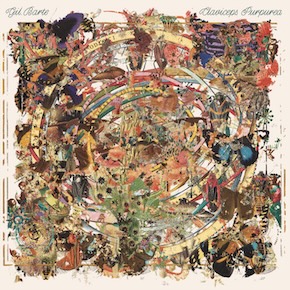 When it comes to menacing, low-BPM techno, Gil.Barte ranks high on my list. I somehow missed that this, his vinyl full-length debut came out last year, but I’ve learned a valuable lesson: pay extremely close attention to any label called Teenage Menopause Records. His EPs were sparse and glorious, and Claviceps Purpurea is a true full-length, offering eight robust tracks and over forty minutes of the French producer’s signature skulk. While the tenor remains subdued and brooding, he manages to avoid repeating himself without discarding what made his earlier work so exciting. The sound palette has widened, bringing in bass-guitars, grisly vocal samples, modular-synth interference and other forms of deliberate sonic shrapnel. It’s downright serpentine, though more in the spirit of a boa constrictor quietly digesting a sloth in the shade, less a cobra poised to strike. “Kobold” invokes the claustrophobic terror of being locked in a trunk, only this sedan isn’t speeding down the freeway, it’s slowly submerging into an unmarked pond. “Martha’s Doll” almost gets the party going, albeit a party on the fresh burial site of some superhuman AI server. Unlike many forms of goth-influenced or industrial techno, the darkness in Gil.Barte’s music is consistently fun, a gloomy delight akin to the silhouettes of Chris and Cosey cryptically gyrating from across the dungeon.
When it comes to menacing, low-BPM techno, Gil.Barte ranks high on my list. I somehow missed that this, his vinyl full-length debut came out last year, but I’ve learned a valuable lesson: pay extremely close attention to any label called Teenage Menopause Records. His EPs were sparse and glorious, and Claviceps Purpurea is a true full-length, offering eight robust tracks and over forty minutes of the French producer’s signature skulk. While the tenor remains subdued and brooding, he manages to avoid repeating himself without discarding what made his earlier work so exciting. The sound palette has widened, bringing in bass-guitars, grisly vocal samples, modular-synth interference and other forms of deliberate sonic shrapnel. It’s downright serpentine, though more in the spirit of a boa constrictor quietly digesting a sloth in the shade, less a cobra poised to strike. “Kobold” invokes the claustrophobic terror of being locked in a trunk, only this sedan isn’t speeding down the freeway, it’s slowly submerging into an unmarked pond. “Martha’s Doll” almost gets the party going, albeit a party on the fresh burial site of some superhuman AI server. Unlike many forms of goth-influenced or industrial techno, the darkness in Gil.Barte’s music is consistently fun, a gloomy delight akin to the silhouettes of Chris and Cosey cryptically gyrating from across the dungeon.
Hatihati Whip It / Head 12″ (Deewee)
 Recent trends in electronic music have veered toward quieter, background-safe sounds, where yoga studios and lush waterfalls morph into one holistic piece of Ezekiel bread. Perhaps that’s why I’m feeling so refreshed by the debut single from Hatihati, as these songs are designed to be experienced at a volume that renders conversation impossible. “Whip It” is something I want to experience with friends (and a couple enemies) in a crowded windowless room, unable to make out what we’re saying even when screaming in each others’ ears. It’s got a half-time stomping rhythm that I’d associate with the more ‘roided-up first-wave dubstep sound (think Benga, Kutz, Ed Solo), but it’s delivered through the millions of refracted rainbows that bounce off a smashed iPad screen (who needs a disco ball?). Not a DEVO cover, this track takes PC Music’s extreme digital elasticity and hangs some Truck Nutz from it, a Dragula that runs on cheap champagne, not zombie blood. “Head” remains in that same manic state but looks towards Ed Banger for inspiration, building up and knocking down a red-lining Mr. Oizo arpeggio with multiple voices enunciating “head” like Benny Benassi on the first bad trip of his life. Hedonistic, loud and probably a little stupid, Hatihati won’t inspire me to Jackass levels of self-harm buffoonery, but it might convince me to commingle my alcohol intake like a college freshman. Two white wines and a whiskey, please!
Recent trends in electronic music have veered toward quieter, background-safe sounds, where yoga studios and lush waterfalls morph into one holistic piece of Ezekiel bread. Perhaps that’s why I’m feeling so refreshed by the debut single from Hatihati, as these songs are designed to be experienced at a volume that renders conversation impossible. “Whip It” is something I want to experience with friends (and a couple enemies) in a crowded windowless room, unable to make out what we’re saying even when screaming in each others’ ears. It’s got a half-time stomping rhythm that I’d associate with the more ‘roided-up first-wave dubstep sound (think Benga, Kutz, Ed Solo), but it’s delivered through the millions of refracted rainbows that bounce off a smashed iPad screen (who needs a disco ball?). Not a DEVO cover, this track takes PC Music’s extreme digital elasticity and hangs some Truck Nutz from it, a Dragula that runs on cheap champagne, not zombie blood. “Head” remains in that same manic state but looks towards Ed Banger for inspiration, building up and knocking down a red-lining Mr. Oizo arpeggio with multiple voices enunciating “head” like Benny Benassi on the first bad trip of his life. Hedonistic, loud and probably a little stupid, Hatihati won’t inspire me to Jackass levels of self-harm buffoonery, but it might convince me to commingle my alcohol intake like a college freshman. Two white wines and a whiskey, please!
Mall Grab New York 12″ (Fragrance)
 There he is on the cover, the young bachelor Mall Grab, dazzled by the neon-light metropolitan bustle of The Big Apple, so very far from home (Australia by way of London). Will the city consume him, or will he rise to stardom? By whatever lucky break or concerted achievement, Mall Grab has become one of the rising names of mainstream-via-underground techno; for example, he’s the guy that Turnstile calls when they need a dance remix EP. (Steve Aoki would’ve been interested but he already slabbed all of his Turnstile collector vinyls, sorry.) New York offers another four cuts of extremely obvious main-stage techno, tastefully integrating trance signifiers and vocal Burialisms to songs that echo the ebullient party vibes of Robin S.’s “Show Me Love”. A typical jungle beat is smoothed over in “New York”, shapeshifting into a blissful tranquility worthy of a Kelly Lee Owens set. Mall Grab thrives in this zone, one where unambiguous techno party beats donk you on the head with hooks that are easy enough to sing along with (even if it’s your very first time hearing them). It’s probably one of the easiest forms of electronic dance music to hate, as Mall Grab holds a magnifying glass to techno’s most conspicuous qualities, but depending on your personal persuasion, also one of the easiest forms to love. I, for one, hope he makes it.
There he is on the cover, the young bachelor Mall Grab, dazzled by the neon-light metropolitan bustle of The Big Apple, so very far from home (Australia by way of London). Will the city consume him, or will he rise to stardom? By whatever lucky break or concerted achievement, Mall Grab has become one of the rising names of mainstream-via-underground techno; for example, he’s the guy that Turnstile calls when they need a dance remix EP. (Steve Aoki would’ve been interested but he already slabbed all of his Turnstile collector vinyls, sorry.) New York offers another four cuts of extremely obvious main-stage techno, tastefully integrating trance signifiers and vocal Burialisms to songs that echo the ebullient party vibes of Robin S.’s “Show Me Love”. A typical jungle beat is smoothed over in “New York”, shapeshifting into a blissful tranquility worthy of a Kelly Lee Owens set. Mall Grab thrives in this zone, one where unambiguous techno party beats donk you on the head with hooks that are easy enough to sing along with (even if it’s your very first time hearing them). It’s probably one of the easiest forms of electronic dance music to hate, as Mall Grab holds a magnifying glass to techno’s most conspicuous qualities, but depending on your personal persuasion, also one of the easiest forms to love. I, for one, hope he makes it.
Mandy, Indiana Urgh LP (Sacred Bones)
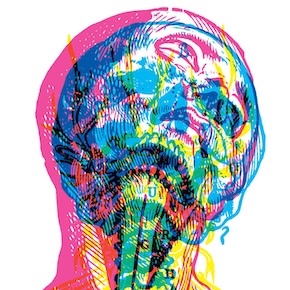 If you trash-compacted the two basic focal points of this blog – ugly guitar music and creative electronic music – the resulting mangled byproduct might resemble something like Manchester’s Mandy, Indiana. Their 2023 full-length debut arrived fully-formed, and Urgh upholds the strategy of absolutely jackhammering the drums, guitars, electronics and vocals wielded by this quartet. Manchester is a dance music town, but forget the typical club etiquette – Mandy, Indiana’s overtly electronic sounds necessitate mosh-pits full of art-damaged weaklings who don’t know how to mosh (always a beautiful sight). Their productions call back to a variety of aggressive, DIY electronic sounds (Nasenbluten, Doormouse, Blawan and Huren, let’s say), anti-social techno that reacted against friendly party people comfortably having fun. The guitar is harder to pick out among all the alarm-siren synths and pummeling beats, but it makes more sense as another chaotic texture than any sort of riff manufacturer anyway. I can’t imagine Mandy, Indiana will ever pursue the upper 250 BPMs of terror-core – they prefer slamming over thrashing – but aggression is key. They’d fit just as comfortably on stage alongside the STD electro of Sextile as one of Orchid’s (or Black Eyes’s) ongoing reunion gigs, which is a cool place to be. Urgh‘s a wild ride right through closer “I’ll Ask Her”, which conjures the street horror of Gazelle Twin’s Unflesh era, raw and sobering.
If you trash-compacted the two basic focal points of this blog – ugly guitar music and creative electronic music – the resulting mangled byproduct might resemble something like Manchester’s Mandy, Indiana. Their 2023 full-length debut arrived fully-formed, and Urgh upholds the strategy of absolutely jackhammering the drums, guitars, electronics and vocals wielded by this quartet. Manchester is a dance music town, but forget the typical club etiquette – Mandy, Indiana’s overtly electronic sounds necessitate mosh-pits full of art-damaged weaklings who don’t know how to mosh (always a beautiful sight). Their productions call back to a variety of aggressive, DIY electronic sounds (Nasenbluten, Doormouse, Blawan and Huren, let’s say), anti-social techno that reacted against friendly party people comfortably having fun. The guitar is harder to pick out among all the alarm-siren synths and pummeling beats, but it makes more sense as another chaotic texture than any sort of riff manufacturer anyway. I can’t imagine Mandy, Indiana will ever pursue the upper 250 BPMs of terror-core – they prefer slamming over thrashing – but aggression is key. They’d fit just as comfortably on stage alongside the STD electro of Sextile as one of Orchid’s (or Black Eyes’s) ongoing reunion gigs, which is a cool place to be. Urgh‘s a wild ride right through closer “I’ll Ask Her”, which conjures the street horror of Gazelle Twin’s Unflesh era, raw and sobering.
ÖPNV +4917635713990 LP (Phantom)
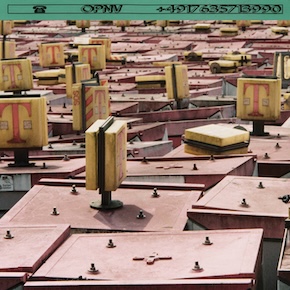 On their second full-length, Berliner punk roboter ÖPNV look towards our modern modes of communication with suspicion and disrespect. They’re pretty modern themselves, a trio that crafts their music using a variety of computer-based manipulations rather than your typical guitars and amps. They opt for real-sounding fake drums, synths on their most irritating settings, bass guitar and a whole ZIP file’s worth of sound-effects and samples. It’s the type of thing that could be as big of a presentation as DEVO at Coachella or as small as one lonely punk with a laptop and USB drive, but their mode of operation seems to fall somewhere in between. I’m reminded a lot of Heavy Metal (the band) in the way that the drums lend a sense of artificiality over shout-along choruses and mid-tempo hooks, and also in the way that samples are deployed as punchlines. A particular example can be found in “Sprechfunk”, which breaks for a pitched-down version of an incredibly familiar digital chime that’s been keeping me up at night until I can figure out where it’s from (AOL? The earliest iPhone? An AT&T busy signal? Help!). The a-side ends in a locked groove of an iPhone vibration, producing whatever panic endorphins that sound has trained in us… even the record cover’s endless field of T-Mobile boxes is some sort of commentary, I’m sure. It’s all in German, I should mention, but the seasick plink-plonk of “Kaputtnik” makes perfect sense to me: picture Abwärts spiraling into reduced service due to excessive data usage.
On their second full-length, Berliner punk roboter ÖPNV look towards our modern modes of communication with suspicion and disrespect. They’re pretty modern themselves, a trio that crafts their music using a variety of computer-based manipulations rather than your typical guitars and amps. They opt for real-sounding fake drums, synths on their most irritating settings, bass guitar and a whole ZIP file’s worth of sound-effects and samples. It’s the type of thing that could be as big of a presentation as DEVO at Coachella or as small as one lonely punk with a laptop and USB drive, but their mode of operation seems to fall somewhere in between. I’m reminded a lot of Heavy Metal (the band) in the way that the drums lend a sense of artificiality over shout-along choruses and mid-tempo hooks, and also in the way that samples are deployed as punchlines. A particular example can be found in “Sprechfunk”, which breaks for a pitched-down version of an incredibly familiar digital chime that’s been keeping me up at night until I can figure out where it’s from (AOL? The earliest iPhone? An AT&T busy signal? Help!). The a-side ends in a locked groove of an iPhone vibration, producing whatever panic endorphins that sound has trained in us… even the record cover’s endless field of T-Mobile boxes is some sort of commentary, I’m sure. It’s all in German, I should mention, but the seasick plink-plonk of “Kaputtnik” makes perfect sense to me: picture Abwärts spiraling into reduced service due to excessive data usage.
Simon Peter Souvenir 12″ (Is It Balearic?)
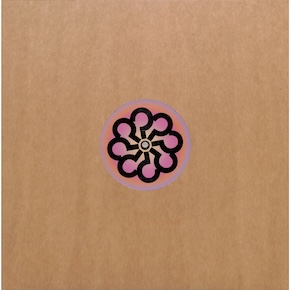 Balearic music isn’t solely a dominion of silk shirts on the beach with all-you-can-eat shrimp cocktail, it’s also cable-knit sweaters on the ski chateau’s fireside bearskin rug. It’s an all-season appropriate vibe I’m picking up from Simon Peter’s buttery-smooth new EP, Souvenir. The title track sounds like a castaway from Universal Cave’s exquisite Soft Rock For Hard Times series, a simmering folksy strum over pristine synth arpeggios sure to unbutton every shirt in the room. Sumptuous! “Mystical Delight” follows with even more guitar, in league with Schoenherz’s “Sultry Nights” in both atmosphere and successful song-title manifestation. “Still Going” sways like a smoke break from Batteaux’s self-titled album, and while that’s more than my money’s worth, we also get two “Souvenir” remixes here, from both Peaking Lights and Coyote. Peaking Lights add some stardust, whereas labelheads Coyote go all Transfer Station Blue on their version… no matter what the weather is outside, the shower glass is fully steamed. You might think you caught a glance of Michael Douglas and Sharon Stone fight-humping through the penthouse window, but it’s only a souvenir…
Balearic music isn’t solely a dominion of silk shirts on the beach with all-you-can-eat shrimp cocktail, it’s also cable-knit sweaters on the ski chateau’s fireside bearskin rug. It’s an all-season appropriate vibe I’m picking up from Simon Peter’s buttery-smooth new EP, Souvenir. The title track sounds like a castaway from Universal Cave’s exquisite Soft Rock For Hard Times series, a simmering folksy strum over pristine synth arpeggios sure to unbutton every shirt in the room. Sumptuous! “Mystical Delight” follows with even more guitar, in league with Schoenherz’s “Sultry Nights” in both atmosphere and successful song-title manifestation. “Still Going” sways like a smoke break from Batteaux’s self-titled album, and while that’s more than my money’s worth, we also get two “Souvenir” remixes here, from both Peaking Lights and Coyote. Peaking Lights add some stardust, whereas labelheads Coyote go all Transfer Station Blue on their version… no matter what the weather is outside, the shower glass is fully steamed. You might think you caught a glance of Michael Douglas and Sharon Stone fight-humping through the penthouse window, but it’s only a souvenir…
Ravi Shavi Erase America LP (Almost Ready)
 Though Providence’s Ravi Shavi have consistently indulged in rock n’ roll revelry throughout their existence, they can’t help but comment on the shameful state of the nation with their newest full-length for the Almost Ready label, Erase America. The whole record is a righteous anti-American screed, but if you had some people over and weren’t paying close attention to the vocals, that point might evade you. The music remains feel-good, universally-familiar garage-punk in the vein of Ian Svenonius’s various projects (with a touch of Liars’ early dance-y post-punk style), with snappy and effective guitar licks and a peppy rhythm section to keep feet moving. Take a note of the content, however, and you’ll realize that Ravi Shavi is as rage-filled as these times necessitate: song titles like “Killer Whites”, “Fresh Hell”, “Intifada” and “New Brown Neighbors” don’t beat around the bush. Without a lyric sheet, I’m straining (and quite interested) to hear what Ravi Shavi have to say, even if the much-needed general sentiments are crystal clear – the repeated line “the motherland of killing another man” is unmistakable, at least. They take a break from all the black-pointy-shoe dancing with the groaning, decrepit dirge “Miracle Bombs”, whose mood certainly matches the experience of living through Trump’s second administration. It’s a nice breather before “Action” snaps us, James Chance-like, into motion. Even if their social analysis doesn’t go much deeper than the provocative song titles, it’s refreshing and comforting to see more punks kicking back in the face of naked fascism.
Though Providence’s Ravi Shavi have consistently indulged in rock n’ roll revelry throughout their existence, they can’t help but comment on the shameful state of the nation with their newest full-length for the Almost Ready label, Erase America. The whole record is a righteous anti-American screed, but if you had some people over and weren’t paying close attention to the vocals, that point might evade you. The music remains feel-good, universally-familiar garage-punk in the vein of Ian Svenonius’s various projects (with a touch of Liars’ early dance-y post-punk style), with snappy and effective guitar licks and a peppy rhythm section to keep feet moving. Take a note of the content, however, and you’ll realize that Ravi Shavi is as rage-filled as these times necessitate: song titles like “Killer Whites”, “Fresh Hell”, “Intifada” and “New Brown Neighbors” don’t beat around the bush. Without a lyric sheet, I’m straining (and quite interested) to hear what Ravi Shavi have to say, even if the much-needed general sentiments are crystal clear – the repeated line “the motherland of killing another man” is unmistakable, at least. They take a break from all the black-pointy-shoe dancing with the groaning, decrepit dirge “Miracle Bombs”, whose mood certainly matches the experience of living through Trump’s second administration. It’s a nice breather before “Action” snaps us, James Chance-like, into motion. Even if their social analysis doesn’t go much deeper than the provocative song titles, it’s refreshing and comforting to see more punks kicking back in the face of naked fascism.
Shackleton Euphoria Bound 2xLP (AD 93)
 Shaq’s back! The Berlin-based producer is one of the most singular electronic artists of this millennium (or any other, I suppose), and one of the busiest, too. Recent years have seen him focusing on collaborative efforts that run quite a creative range; I honestly forgot he did that album with Six Organs Of Admittance until looking it up again now (and it’s overdue for a spin). I always love Shackleton best when he’s freewheelin’ on his own, though, and Euphoria Bound is a thrilling distillation of the peculiar sonic aesthetic he’s carefully cultivated over the last couple decades. His music brandishes a ritualistic sci-fi slant, and it’s never been more focused than this double LP. These tracks sound like the work of advanced alien civilizations interpreting modern earthly club music. The time signatures and percussive elements are somewhat familiar to our human ears, but it’s the sum of Shackleton’s parts that dazzle. I understand that light speed exists, but I can’t grasp how exactly the Large Hadron Collider works, and the same could be said for Shackleton’s productions, as inventive and striking as body-moving, a full-bodied psychedelic fun. Man On A String Part 1 And 2 / Bastard Spirit and The Drawbar Organ EPs have been my personal faves for a minute, but the further I dip into Euphoria Bound, who knows what might happen…
Shaq’s back! The Berlin-based producer is one of the most singular electronic artists of this millennium (or any other, I suppose), and one of the busiest, too. Recent years have seen him focusing on collaborative efforts that run quite a creative range; I honestly forgot he did that album with Six Organs Of Admittance until looking it up again now (and it’s overdue for a spin). I always love Shackleton best when he’s freewheelin’ on his own, though, and Euphoria Bound is a thrilling distillation of the peculiar sonic aesthetic he’s carefully cultivated over the last couple decades. His music brandishes a ritualistic sci-fi slant, and it’s never been more focused than this double LP. These tracks sound like the work of advanced alien civilizations interpreting modern earthly club music. The time signatures and percussive elements are somewhat familiar to our human ears, but it’s the sum of Shackleton’s parts that dazzle. I understand that light speed exists, but I can’t grasp how exactly the Large Hadron Collider works, and the same could be said for Shackleton’s productions, as inventive and striking as body-moving, a full-bodied psychedelic fun. Man On A String Part 1 And 2 / Bastard Spirit and The Drawbar Organ EPs have been my personal faves for a minute, but the further I dip into Euphoria Bound, who knows what might happen…
Yorgos Stavridis Solo Percussion LP (Heat Crimes)
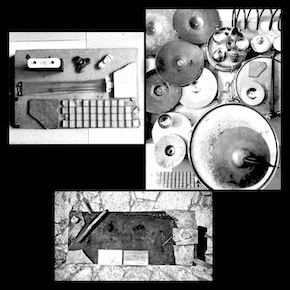 Cleve Pozar set the bar high with his own Solo Percussion album back in 1974, but Yorgos Stavridis is a worthy heir to the throne. It’s a genre I tend to enjoy – I kind of think every human has at least one good Solo Percussion buried within them – though Stavridis has clearly put a lot of thought and technique into the seven pieces here, performed and recorded live. I’d assume he was a traditionally-trained drummer at some point, based on the fluid wrist-action on opener “Pile Of”, but he delves deep into the very nature of sound itself as the album progresses. A wide variety of resonating surfaces are explored, resulting in a kaleidoscope of wicked timbres, unintuitive patterns and a general sense of the otherworldly existing within the quotidian. The simple chime of a bell is the focal point of “Clink”, which evolves into a paranoid, twinkling orchestra of one. “Cymbal Friction” takes the titular instrument and wrings a mesmerizing futurist drone out of it, uncovering unknown sounds buried deep within the copper alloy. Judging from the instruments (or fractured shards of instruments) on the cover, Stavridis relishes the chance to truly investigate sound from these likely and unlikely sources, and his findings are bold and engrossing.
Cleve Pozar set the bar high with his own Solo Percussion album back in 1974, but Yorgos Stavridis is a worthy heir to the throne. It’s a genre I tend to enjoy – I kind of think every human has at least one good Solo Percussion buried within them – though Stavridis has clearly put a lot of thought and technique into the seven pieces here, performed and recorded live. I’d assume he was a traditionally-trained drummer at some point, based on the fluid wrist-action on opener “Pile Of”, but he delves deep into the very nature of sound itself as the album progresses. A wide variety of resonating surfaces are explored, resulting in a kaleidoscope of wicked timbres, unintuitive patterns and a general sense of the otherworldly existing within the quotidian. The simple chime of a bell is the focal point of “Clink”, which evolves into a paranoid, twinkling orchestra of one. “Cymbal Friction” takes the titular instrument and wrings a mesmerizing futurist drone out of it, uncovering unknown sounds buried deep within the copper alloy. Judging from the instruments (or fractured shards of instruments) on the cover, Stavridis relishes the chance to truly investigate sound from these likely and unlikely sources, and his findings are bold and engrossing.
Strange Program Strange Program LP (Bumbo)
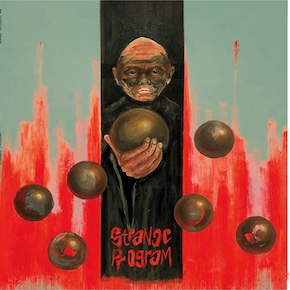 “Detroit Psych Mutation” says the sticker on the sleeve, three words almost as satisfying as “peanut butter chocolate”. Strange Program are a rock trio featuring members of Druid Perfume, Red Red Red and Bumbo’s Tinto Brass Band, and their particular mutation is easy on the ears, the work of seasoned rockers who know how to squeeze the sweetest juice out of their sound. There’s plenty of auxiliary weirdness, usually in the form of Looney Tunes-esque percussive elements, and the songs themselves seem easily distracted, prone to veering off course. It’s like one member makes a funny face, let’s say bassist Bumbo Krawczyk, and the other two guys notice and momentarily forget where they’re at, but in a good way. Even if it feels like they may dip into the same pouch of magical substances as Lavender Flu (or even Timmy’s Organism), Strange Program never loses the script, an album whose maturity is evident even amidst brash and kooky behavior. It’s the sort of thing that In The Red Records usually likes to invest its hard-earned dollars in, and perhaps might someday in the future. I could easily imagine the album resonating with the many King Gizzard fans that apparently walk among us, what with the penchant for abusing Van Halen-esque riffs, a sense of wide-eyed rock n’ roll adventure and some good-natured clownery, too. For so many things, Detroit is where it’s at.
“Detroit Psych Mutation” says the sticker on the sleeve, three words almost as satisfying as “peanut butter chocolate”. Strange Program are a rock trio featuring members of Druid Perfume, Red Red Red and Bumbo’s Tinto Brass Band, and their particular mutation is easy on the ears, the work of seasoned rockers who know how to squeeze the sweetest juice out of their sound. There’s plenty of auxiliary weirdness, usually in the form of Looney Tunes-esque percussive elements, and the songs themselves seem easily distracted, prone to veering off course. It’s like one member makes a funny face, let’s say bassist Bumbo Krawczyk, and the other two guys notice and momentarily forget where they’re at, but in a good way. Even if it feels like they may dip into the same pouch of magical substances as Lavender Flu (or even Timmy’s Organism), Strange Program never loses the script, an album whose maturity is evident even amidst brash and kooky behavior. It’s the sort of thing that In The Red Records usually likes to invest its hard-earned dollars in, and perhaps might someday in the future. I could easily imagine the album resonating with the many King Gizzard fans that apparently walk among us, what with the penchant for abusing Van Halen-esque riffs, a sense of wide-eyed rock n’ roll adventure and some good-natured clownery, too. For so many things, Detroit is where it’s at.
Terrine Jazz Band Theory LP (Bruit Direct Disques)
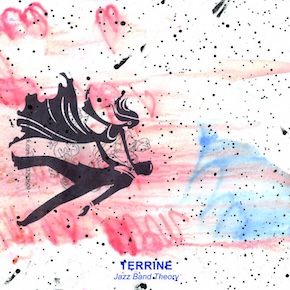 The last time I put on Jazz Band Theory, I was already nursing a raging headache, essentially beating Terrine to the punch. Across four full-lengths for Bruit Direct, the solo project of one Claire Gapenne continues to confound in ways that only the most dedicated of self-punishing experimental music lovers (such as myself, and at least some of you) will savor. Jazz Band Theory is Terrine’s newest excavation into the deepest recesses of her mind, body and hard-drive, with multiple incongruous parts fused into stand-alone “tracks” by a logic inaccessible to this writer. A majority chunk of this record comes across like cinema vérité of an electronics repair shop on the busiest day of their year. Take a broken drum machine, twiddle its knobs a bit, then take that recording and chop it into little digital snippets… then cut-and-paste it wildly across your DAW of choice. Occasionally things will cohere into what one might call a groove (a minute into “Weekly Vlog”, for example), but you’re just as likely to be left stranded in a field of dying consumer electronics without plot or context. Unlike prior outings that offered some obscure thread to be followed, Terrine’s experiments here recall the deep abstractionism of folks like Vertonen, Irr. App. (Ext.) and Joe Colley, but even those artists tend to settle into an idea and carve a safe-space from within it. Just when you think you can relax into a rally of malfunctioning beats, Terrine will whip out an acoustic guitar, or a piano, and remind you that you’re never safe in her world of sound.
The last time I put on Jazz Band Theory, I was already nursing a raging headache, essentially beating Terrine to the punch. Across four full-lengths for Bruit Direct, the solo project of one Claire Gapenne continues to confound in ways that only the most dedicated of self-punishing experimental music lovers (such as myself, and at least some of you) will savor. Jazz Band Theory is Terrine’s newest excavation into the deepest recesses of her mind, body and hard-drive, with multiple incongruous parts fused into stand-alone “tracks” by a logic inaccessible to this writer. A majority chunk of this record comes across like cinema vérité of an electronics repair shop on the busiest day of their year. Take a broken drum machine, twiddle its knobs a bit, then take that recording and chop it into little digital snippets… then cut-and-paste it wildly across your DAW of choice. Occasionally things will cohere into what one might call a groove (a minute into “Weekly Vlog”, for example), but you’re just as likely to be left stranded in a field of dying consumer electronics without plot or context. Unlike prior outings that offered some obscure thread to be followed, Terrine’s experiments here recall the deep abstractionism of folks like Vertonen, Irr. App. (Ext.) and Joe Colley, but even those artists tend to settle into an idea and carve a safe-space from within it. Just when you think you can relax into a rally of malfunctioning beats, Terrine will whip out an acoustic guitar, or a piano, and remind you that you’re never safe in her world of sound.
The Velvet Underground Sunday’s Clown LP (no label)
 There are many forms of musical nerdery of which I’m willing to accept some amount of personal complicity, but in all honesty, “live bootleg enthusiast” isn’t one of them, classic-rock or otherwise. There’s a certain sort of musical-scientist type who savors the ability to deconstruct and evaluate the myriad subtle differences in live renditions by Neil Young or whatever, but I ain’t one of ’em. That said, when a man in a fedora, black sunglasses and a buttoned-up trenchcoat slid me this new Velvet Underground boot tucked surreptitiously into a folded copy of the Provincetown Independent, I wasn’t going to ignore it on account of some self-imposed rule. If there’s one worthy exception to the “no live bootleg” stance, it’s gotta be the Velvets, whose Quine Tapes and Sweet Sister Ray went on to inspire countless underground rockers (many of whom I adore). This newly pressed set, taken from a summer 1966 performance in Provincetown, MA, sticks out to me for two reasons: one, the inclusion of the never-properly-released original “I’m Not A Young Man Anymore”, and two, the performances’ enthusiastic descriptions on the back cover, providing insight into the material from the rabid obsessed-fan perspective (so we don’t have to rabidly obsess ourselves). To some, it might sound like Velvet Underground classics performed through an old drainpipe, which is fine on its own merit; to others, this is another crucial piece of the puzzle, like a crystal urn hunted down by Indiana Jones.
There are many forms of musical nerdery of which I’m willing to accept some amount of personal complicity, but in all honesty, “live bootleg enthusiast” isn’t one of them, classic-rock or otherwise. There’s a certain sort of musical-scientist type who savors the ability to deconstruct and evaluate the myriad subtle differences in live renditions by Neil Young or whatever, but I ain’t one of ’em. That said, when a man in a fedora, black sunglasses and a buttoned-up trenchcoat slid me this new Velvet Underground boot tucked surreptitiously into a folded copy of the Provincetown Independent, I wasn’t going to ignore it on account of some self-imposed rule. If there’s one worthy exception to the “no live bootleg” stance, it’s gotta be the Velvets, whose Quine Tapes and Sweet Sister Ray went on to inspire countless underground rockers (many of whom I adore). This newly pressed set, taken from a summer 1966 performance in Provincetown, MA, sticks out to me for two reasons: one, the inclusion of the never-properly-released original “I’m Not A Young Man Anymore”, and two, the performances’ enthusiastic descriptions on the back cover, providing insight into the material from the rabid obsessed-fan perspective (so we don’t have to rabidly obsess ourselves). To some, it might sound like Velvet Underground classics performed through an old drainpipe, which is fine on its own merit; to others, this is another crucial piece of the puzzle, like a crystal urn hunted down by Indiana Jones.
White Cross Fascist 7″ (Beach Impediment)
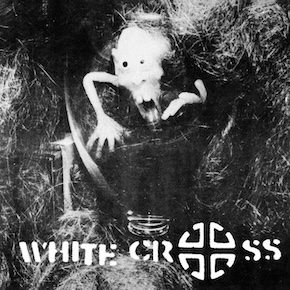 A faithful reissue of White Cross’s debut EP has been overdue for a while, so let’s thank the good brothers over at Beach Impediment for making it happen. The label has never been short on Virginia hardcore pride, and White Cross may very well be the hardcore-punk band most worthy of that pride (sorry, Avail!). As for this reissue, it’s appealingly faithful to the original design, with that great cover imagery that appears to be piles of hair and a rubber finger puppet on a Xerox machine. Who knows for sure? As for the music, White Cross raged with the best of ’em, a youthful thrash in league with their DC neighbors and, if you sped up 95 North for another five hours, Mutha’s mutant menagerie. I will forever experience a brief moment of disorientation when someone says “hardcore” in reference to stuff like E-Town Concrete or Code Orange, as I’m already too well trained to the textbook formula as rendered by White Cross’s eight songs here. I’m never going to listen to a word Jeff Bale has to say, but he got it right back in his Maximumrocknroll review of Fascist in 1982: “they’ve got that extra intensity which separates great thrash from the increasingly common generic variety.”
A faithful reissue of White Cross’s debut EP has been overdue for a while, so let’s thank the good brothers over at Beach Impediment for making it happen. The label has never been short on Virginia hardcore pride, and White Cross may very well be the hardcore-punk band most worthy of that pride (sorry, Avail!). As for this reissue, it’s appealingly faithful to the original design, with that great cover imagery that appears to be piles of hair and a rubber finger puppet on a Xerox machine. Who knows for sure? As for the music, White Cross raged with the best of ’em, a youthful thrash in league with their DC neighbors and, if you sped up 95 North for another five hours, Mutha’s mutant menagerie. I will forever experience a brief moment of disorientation when someone says “hardcore” in reference to stuff like E-Town Concrete or Code Orange, as I’m already too well trained to the textbook formula as rendered by White Cross’s eight songs here. I’m never going to listen to a word Jeff Bale has to say, but he got it right back in his Maximumrocknroll review of Fascist in 1982: “they’ve got that extra intensity which separates great thrash from the increasingly common generic variety.”
Future Left Behind compilation LP (Second Street)
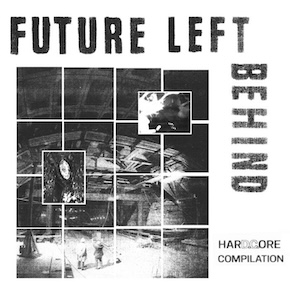 The return of carefully-produced regional compilations would be a welcome corrective to our flattened digital listening experience. What better way to fight back against the contextless deluge of surprise-free content than a record made by a flourishing punk community in celebration of itself? Not every city is lucky enough to have a record shop as culturally nourishing as DC’s Joint Custody, but we can certainly learn from how they’re doing it there: in service of people, not algorithms. Future Left Behind features fourteen tracks by fourteen different hardcore bands, all recorded in Joint Custody after business hours (and where exactly, I don’t know – does their basement space have its own additional basement??). Fans of American hardcore might recognize names like Protester, Laughing Corpse and Brain Tourniquet, but like a true classic hardcore comp, it’s probably a band you’ve never heard of before that’ll end up being your favorite. Whereas DC hardcore might conjure certain adjectives – let’s say emotional, self-serious, thoughtful, chiding – Future Left Behind leans in a crustier, more raging direction. There certainly aren’t any capital-H careerists here, only do-it-together punks who mosh with love because the music inspires it, not hate because the meathead singer ordered you to. I thought the Brain Tourniquet song is pretty ace (written on the drums first in what must’ve been some sort of mean-spirited prank against the other band members); Deliriant Nerve’s gurgle-throat grind was a treat as well, and Grand Scheme continue to make me want to throttle my best friend by his hoodie until the neck is stretched. What’s your scene like?
The return of carefully-produced regional compilations would be a welcome corrective to our flattened digital listening experience. What better way to fight back against the contextless deluge of surprise-free content than a record made by a flourishing punk community in celebration of itself? Not every city is lucky enough to have a record shop as culturally nourishing as DC’s Joint Custody, but we can certainly learn from how they’re doing it there: in service of people, not algorithms. Future Left Behind features fourteen tracks by fourteen different hardcore bands, all recorded in Joint Custody after business hours (and where exactly, I don’t know – does their basement space have its own additional basement??). Fans of American hardcore might recognize names like Protester, Laughing Corpse and Brain Tourniquet, but like a true classic hardcore comp, it’s probably a band you’ve never heard of before that’ll end up being your favorite. Whereas DC hardcore might conjure certain adjectives – let’s say emotional, self-serious, thoughtful, chiding – Future Left Behind leans in a crustier, more raging direction. There certainly aren’t any capital-H careerists here, only do-it-together punks who mosh with love because the music inspires it, not hate because the meathead singer ordered you to. I thought the Brain Tourniquet song is pretty ace (written on the drums first in what must’ve been some sort of mean-spirited prank against the other band members); Deliriant Nerve’s gurgle-throat grind was a treat as well, and Grand Scheme continue to make me want to throttle my best friend by his hoodie until the neck is stretched. What’s your scene like?
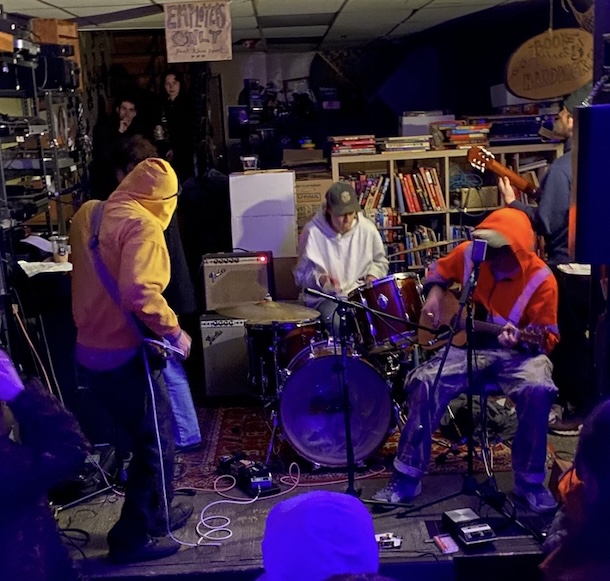

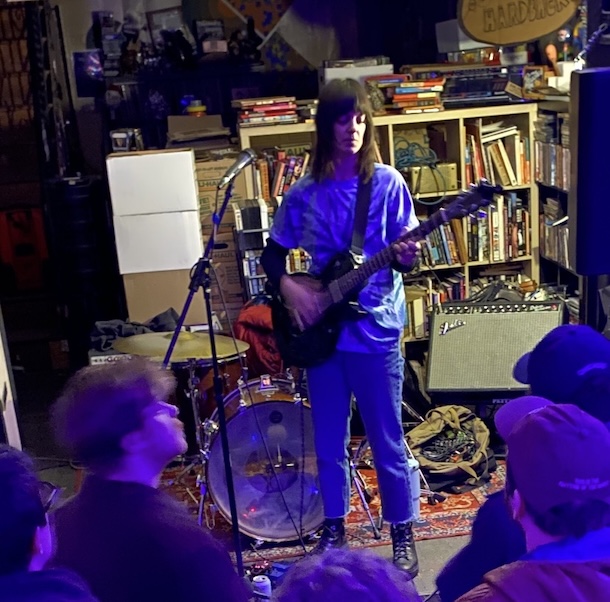
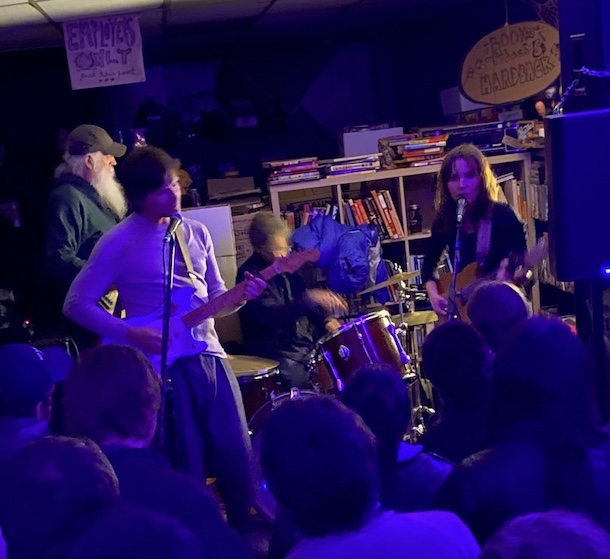



 When it comes to menacing, low-BPM techno, Gil.Barte ranks high on my list. I somehow missed that this, his vinyl full-length debut came out last year, but I’ve learned a valuable lesson: pay extremely close attention to any label called Teenage Menopause Records. His EPs were sparse and glorious, and Claviceps Purpurea is a true full-length, offering eight robust tracks and over forty minutes of the French producer’s signature skulk. While the tenor remains subdued and brooding, he manages to avoid repeating himself without discarding what made his earlier work so exciting. The sound palette has widened, bringing in bass-guitars, grisly vocal samples, modular-synth interference and other forms of deliberate sonic shrapnel. It’s downright serpentine, though more in the spirit of a boa constrictor quietly digesting a sloth in the shade, less a cobra poised to strike. “Kobold” invokes the claustrophobic terror of being locked in a trunk, only this sedan isn’t speeding down the freeway, it’s slowly submerging into an unmarked pond. “Martha’s Doll” almost gets the party going, albeit a party on the fresh burial site of some superhuman AI server. Unlike many forms of goth-influenced or industrial techno, the darkness in Gil.Barte’s music is consistently fun, a gloomy delight akin to the silhouettes of Chris and Cosey cryptically gyrating from across the dungeon.
When it comes to menacing, low-BPM techno, Gil.Barte ranks high on my list. I somehow missed that this, his vinyl full-length debut came out last year, but I’ve learned a valuable lesson: pay extremely close attention to any label called Teenage Menopause Records. His EPs were sparse and glorious, and Claviceps Purpurea is a true full-length, offering eight robust tracks and over forty minutes of the French producer’s signature skulk. While the tenor remains subdued and brooding, he manages to avoid repeating himself without discarding what made his earlier work so exciting. The sound palette has widened, bringing in bass-guitars, grisly vocal samples, modular-synth interference and other forms of deliberate sonic shrapnel. It’s downright serpentine, though more in the spirit of a boa constrictor quietly digesting a sloth in the shade, less a cobra poised to strike. “Kobold” invokes the claustrophobic terror of being locked in a trunk, only this sedan isn’t speeding down the freeway, it’s slowly submerging into an unmarked pond. “Martha’s Doll” almost gets the party going, albeit a party on the fresh burial site of some superhuman AI server. Unlike many forms of goth-influenced or industrial techno, the darkness in Gil.Barte’s music is consistently fun, a gloomy delight akin to the silhouettes of Chris and Cosey cryptically gyrating from across the dungeon.  Recent trends in electronic music have veered toward quieter, background-safe sounds, where yoga studios and lush waterfalls morph into one holistic piece of Ezekiel bread. Perhaps that’s why I’m feeling so refreshed by the debut single from Hatihati, as these songs are designed to be experienced at a volume that renders conversation impossible. “Whip It” is something I want to experience with friends (and a couple enemies) in a crowded windowless room, unable to make out what we’re saying even when screaming in each others’ ears. It’s got a half-time stomping rhythm that I’d associate with the more ‘roided-up first-wave dubstep sound (think Benga, Kutz, Ed Solo), but it’s delivered through the millions of refracted rainbows that bounce off a smashed iPad screen (who needs a disco ball?). Not a DEVO cover, this track takes PC Music’s extreme digital elasticity and hangs some Truck Nutz from it, a Dragula that runs on cheap champagne, not zombie blood. “Head” remains in that same manic state but looks towards Ed Banger for inspiration, building up and knocking down a red-lining Mr. Oizo arpeggio with multiple voices enunciating “head” like Benny Benassi on the first bad trip of his life. Hedonistic, loud and probably a little stupid, Hatihati won’t inspire me to Jackass levels of self-harm buffoonery, but it might convince me to commingle my alcohol intake like a college freshman. Two white wines and a whiskey, please!
Recent trends in electronic music have veered toward quieter, background-safe sounds, where yoga studios and lush waterfalls morph into one holistic piece of Ezekiel bread. Perhaps that’s why I’m feeling so refreshed by the debut single from Hatihati, as these songs are designed to be experienced at a volume that renders conversation impossible. “Whip It” is something I want to experience with friends (and a couple enemies) in a crowded windowless room, unable to make out what we’re saying even when screaming in each others’ ears. It’s got a half-time stomping rhythm that I’d associate with the more ‘roided-up first-wave dubstep sound (think Benga, Kutz, Ed Solo), but it’s delivered through the millions of refracted rainbows that bounce off a smashed iPad screen (who needs a disco ball?). Not a DEVO cover, this track takes PC Music’s extreme digital elasticity and hangs some Truck Nutz from it, a Dragula that runs on cheap champagne, not zombie blood. “Head” remains in that same manic state but looks towards Ed Banger for inspiration, building up and knocking down a red-lining Mr. Oizo arpeggio with multiple voices enunciating “head” like Benny Benassi on the first bad trip of his life. Hedonistic, loud and probably a little stupid, Hatihati won’t inspire me to Jackass levels of self-harm buffoonery, but it might convince me to commingle my alcohol intake like a college freshman. Two white wines and a whiskey, please! There he is on the cover, the young bachelor Mall Grab, dazzled by the neon-light metropolitan bustle of The Big Apple, so very far from home (Australia by way of London). Will the city consume him, or will he rise to stardom? By whatever lucky break or concerted achievement, Mall Grab has become one of the rising names of mainstream-via-underground techno; for example, he’s the guy that Turnstile calls when they need a dance remix EP. (Steve Aoki would’ve been interested but he already slabbed all of his Turnstile collector vinyls, sorry.) New York offers another four cuts of extremely obvious main-stage techno, tastefully integrating trance signifiers and vocal Burialisms to songs that echo the ebullient party vibes of Robin S.’s “Show Me Love”. A typical jungle beat is smoothed over in “New York”, shapeshifting into a blissful tranquility worthy of a Kelly Lee Owens set. Mall Grab thrives in this zone, one where unambiguous techno party beats donk you on the head with hooks that are easy enough to sing along with (even if it’s your very first time hearing them). It’s probably one of the easiest forms of electronic dance music to hate, as Mall Grab holds a magnifying glass to techno’s most conspicuous qualities, but depending on your personal persuasion, also one of the easiest forms to love. I, for one, hope he makes it.
There he is on the cover, the young bachelor Mall Grab, dazzled by the neon-light metropolitan bustle of The Big Apple, so very far from home (Australia by way of London). Will the city consume him, or will he rise to stardom? By whatever lucky break or concerted achievement, Mall Grab has become one of the rising names of mainstream-via-underground techno; for example, he’s the guy that Turnstile calls when they need a dance remix EP. (Steve Aoki would’ve been interested but he already slabbed all of his Turnstile collector vinyls, sorry.) New York offers another four cuts of extremely obvious main-stage techno, tastefully integrating trance signifiers and vocal Burialisms to songs that echo the ebullient party vibes of Robin S.’s “Show Me Love”. A typical jungle beat is smoothed over in “New York”, shapeshifting into a blissful tranquility worthy of a Kelly Lee Owens set. Mall Grab thrives in this zone, one where unambiguous techno party beats donk you on the head with hooks that are easy enough to sing along with (even if it’s your very first time hearing them). It’s probably one of the easiest forms of electronic dance music to hate, as Mall Grab holds a magnifying glass to techno’s most conspicuous qualities, but depending on your personal persuasion, also one of the easiest forms to love. I, for one, hope he makes it.  If you trash-compacted the two basic focal points of this blog – ugly guitar music and creative electronic music – the resulting mangled byproduct might resemble something like Manchester’s Mandy, Indiana. Their 2023 full-length debut arrived fully-formed, and Urgh upholds the strategy of absolutely jackhammering the drums, guitars, electronics and vocals wielded by this quartet. Manchester is a dance music town, but forget the typical club etiquette – Mandy, Indiana’s overtly electronic sounds necessitate mosh-pits full of art-damaged weaklings who don’t know how to mosh (always a beautiful sight). Their productions call back to a variety of aggressive, DIY electronic sounds (Nasenbluten, Doormouse, Blawan and Huren, let’s say), anti-social techno that reacted against friendly party people comfortably having fun. The guitar is harder to pick out among all the alarm-siren synths and pummeling beats, but it makes more sense as another chaotic texture than any sort of riff manufacturer anyway. I can’t imagine Mandy, Indiana will ever pursue the upper 250 BPMs of terror-core – they prefer slamming over thrashing – but aggression is key. They’d fit just as comfortably on stage alongside the STD electro of Sextile as one of Orchid’s (or Black Eyes’s) ongoing reunion gigs, which is a cool place to be. Urgh‘s a wild ride right through closer “I’ll Ask Her”, which conjures the street horror of Gazelle Twin’s Unflesh era, raw and sobering.
If you trash-compacted the two basic focal points of this blog – ugly guitar music and creative electronic music – the resulting mangled byproduct might resemble something like Manchester’s Mandy, Indiana. Their 2023 full-length debut arrived fully-formed, and Urgh upholds the strategy of absolutely jackhammering the drums, guitars, electronics and vocals wielded by this quartet. Manchester is a dance music town, but forget the typical club etiquette – Mandy, Indiana’s overtly electronic sounds necessitate mosh-pits full of art-damaged weaklings who don’t know how to mosh (always a beautiful sight). Their productions call back to a variety of aggressive, DIY electronic sounds (Nasenbluten, Doormouse, Blawan and Huren, let’s say), anti-social techno that reacted against friendly party people comfortably having fun. The guitar is harder to pick out among all the alarm-siren synths and pummeling beats, but it makes more sense as another chaotic texture than any sort of riff manufacturer anyway. I can’t imagine Mandy, Indiana will ever pursue the upper 250 BPMs of terror-core – they prefer slamming over thrashing – but aggression is key. They’d fit just as comfortably on stage alongside the STD electro of Sextile as one of Orchid’s (or Black Eyes’s) ongoing reunion gigs, which is a cool place to be. Urgh‘s a wild ride right through closer “I’ll Ask Her”, which conjures the street horror of Gazelle Twin’s Unflesh era, raw and sobering. On their second full-length, Berliner punk roboter ÖPNV look towards our modern modes of communication with suspicion and disrespect. They’re pretty modern themselves, a trio that crafts their music using a variety of computer-based manipulations rather than your typical guitars and amps. They opt for real-sounding fake drums, synths on their most irritating settings, bass guitar and a whole ZIP file’s worth of sound-effects and samples. It’s the type of thing that could be as big of a presentation as DEVO at Coachella or as small as one lonely punk with a laptop and USB drive, but their mode of operation seems to fall somewhere in between. I’m reminded a lot of Heavy Metal (the band) in the way that the drums lend a sense of artificiality over shout-along choruses and mid-tempo hooks, and also in the way that samples are deployed as punchlines. A particular example can be found in “Sprechfunk”, which breaks for a pitched-down version of an incredibly familiar digital chime that’s been keeping me up at night until I can figure out where it’s from (AOL? The earliest iPhone? An AT&T busy signal? Help!). The a-side ends in a locked groove of an iPhone vibration, producing whatever panic endorphins that sound has trained in us… even the record cover’s endless field of T-Mobile boxes is some sort of commentary, I’m sure. It’s all in German, I should mention, but the seasick plink-plonk of “Kaputtnik” makes perfect sense to me: picture Abwärts spiraling into reduced service due to excessive data usage.
On their second full-length, Berliner punk roboter ÖPNV look towards our modern modes of communication with suspicion and disrespect. They’re pretty modern themselves, a trio that crafts their music using a variety of computer-based manipulations rather than your typical guitars and amps. They opt for real-sounding fake drums, synths on their most irritating settings, bass guitar and a whole ZIP file’s worth of sound-effects and samples. It’s the type of thing that could be as big of a presentation as DEVO at Coachella or as small as one lonely punk with a laptop and USB drive, but their mode of operation seems to fall somewhere in between. I’m reminded a lot of Heavy Metal (the band) in the way that the drums lend a sense of artificiality over shout-along choruses and mid-tempo hooks, and also in the way that samples are deployed as punchlines. A particular example can be found in “Sprechfunk”, which breaks for a pitched-down version of an incredibly familiar digital chime that’s been keeping me up at night until I can figure out where it’s from (AOL? The earliest iPhone? An AT&T busy signal? Help!). The a-side ends in a locked groove of an iPhone vibration, producing whatever panic endorphins that sound has trained in us… even the record cover’s endless field of T-Mobile boxes is some sort of commentary, I’m sure. It’s all in German, I should mention, but the seasick plink-plonk of “Kaputtnik” makes perfect sense to me: picture Abwärts spiraling into reduced service due to excessive data usage.  Balearic music isn’t solely a dominion of silk shirts on the beach with all-you-can-eat shrimp cocktail, it’s also cable-knit sweaters on the ski chateau’s fireside bearskin rug. It’s an all-season appropriate vibe I’m picking up from Simon Peter’s buttery-smooth new EP, Souvenir. The title track sounds like a castaway from Universal Cave’s exquisite Soft Rock For Hard Times series, a simmering folksy strum over pristine synth arpeggios sure to unbutton every shirt in the room. Sumptuous! “Mystical Delight” follows with even more guitar, in league with Schoenherz’s “Sultry Nights” in both atmosphere and successful song-title manifestation. “Still Going” sways like a smoke break from Batteaux’s self-titled album, and while that’s more than my money’s worth, we also get two “Souvenir” remixes here, from both Peaking Lights and Coyote. Peaking Lights add some stardust, whereas labelheads Coyote go all Transfer Station Blue on their version… no matter what the weather is outside, the shower glass is fully steamed. You might think you caught a glance of Michael Douglas and Sharon Stone fight-humping through the penthouse window, but it’s only a souvenir…
Balearic music isn’t solely a dominion of silk shirts on the beach with all-you-can-eat shrimp cocktail, it’s also cable-knit sweaters on the ski chateau’s fireside bearskin rug. It’s an all-season appropriate vibe I’m picking up from Simon Peter’s buttery-smooth new EP, Souvenir. The title track sounds like a castaway from Universal Cave’s exquisite Soft Rock For Hard Times series, a simmering folksy strum over pristine synth arpeggios sure to unbutton every shirt in the room. Sumptuous! “Mystical Delight” follows with even more guitar, in league with Schoenherz’s “Sultry Nights” in both atmosphere and successful song-title manifestation. “Still Going” sways like a smoke break from Batteaux’s self-titled album, and while that’s more than my money’s worth, we also get two “Souvenir” remixes here, from both Peaking Lights and Coyote. Peaking Lights add some stardust, whereas labelheads Coyote go all Transfer Station Blue on their version… no matter what the weather is outside, the shower glass is fully steamed. You might think you caught a glance of Michael Douglas and Sharon Stone fight-humping through the penthouse window, but it’s only a souvenir… Though Providence’s Ravi Shavi have consistently indulged in rock n’ roll revelry throughout their existence, they can’t help but comment on the shameful state of the nation with their newest full-length for the Almost Ready label, Erase America. The whole record is a righteous anti-American screed, but if you had some people over and weren’t paying close attention to the vocals, that point might evade you. The music remains feel-good, universally-familiar garage-punk in the vein of Ian Svenonius’s various projects (with a touch of Liars’ early dance-y post-punk style), with snappy and effective guitar licks and a peppy rhythm section to keep feet moving. Take a note of the content, however, and you’ll realize that Ravi Shavi is as rage-filled as these times necessitate: song titles like “Killer Whites”, “Fresh Hell”, “Intifada” and “New Brown Neighbors” don’t beat around the bush. Without a lyric sheet, I’m straining (and quite interested) to hear what Ravi Shavi have to say, even if the much-needed general sentiments are crystal clear – the repeated line “the motherland of killing another man” is unmistakable, at least. They take a break from all the black-pointy-shoe dancing with the groaning, decrepit dirge “Miracle Bombs”, whose mood certainly matches the experience of living through Trump’s second administration. It’s a nice breather before “Action” snaps us, James Chance-like, into motion. Even if their social analysis doesn’t go much deeper than the provocative song titles, it’s refreshing and comforting to see more punks kicking back in the face of naked fascism.
Though Providence’s Ravi Shavi have consistently indulged in rock n’ roll revelry throughout their existence, they can’t help but comment on the shameful state of the nation with their newest full-length for the Almost Ready label, Erase America. The whole record is a righteous anti-American screed, but if you had some people over and weren’t paying close attention to the vocals, that point might evade you. The music remains feel-good, universally-familiar garage-punk in the vein of Ian Svenonius’s various projects (with a touch of Liars’ early dance-y post-punk style), with snappy and effective guitar licks and a peppy rhythm section to keep feet moving. Take a note of the content, however, and you’ll realize that Ravi Shavi is as rage-filled as these times necessitate: song titles like “Killer Whites”, “Fresh Hell”, “Intifada” and “New Brown Neighbors” don’t beat around the bush. Without a lyric sheet, I’m straining (and quite interested) to hear what Ravi Shavi have to say, even if the much-needed general sentiments are crystal clear – the repeated line “the motherland of killing another man” is unmistakable, at least. They take a break from all the black-pointy-shoe dancing with the groaning, decrepit dirge “Miracle Bombs”, whose mood certainly matches the experience of living through Trump’s second administration. It’s a nice breather before “Action” snaps us, James Chance-like, into motion. Even if their social analysis doesn’t go much deeper than the provocative song titles, it’s refreshing and comforting to see more punks kicking back in the face of naked fascism.  Shaq’s back! The Berlin-based producer is one of the most singular electronic artists of this millennium (or any other, I suppose), and one of the busiest, too. Recent years have seen him focusing on collaborative efforts that run quite a creative range; I honestly forgot he did that album with Six Organs Of Admittance until looking it up again now (and it’s overdue for a spin). I always love Shackleton best when he’s freewheelin’ on his own, though, and Euphoria Bound is a thrilling distillation of the peculiar sonic aesthetic he’s carefully cultivated over the last couple decades. His music brandishes a ritualistic sci-fi slant, and it’s never been more focused than this double LP. These tracks sound like the work of advanced alien civilizations interpreting modern earthly club music. The time signatures and percussive elements are somewhat familiar to our human ears, but it’s the sum of Shackleton’s parts that dazzle. I understand that light speed exists, but I can’t grasp how exactly the Large Hadron Collider works, and the same could be said for Shackleton’s productions, as inventive and striking as body-moving, a full-bodied psychedelic fun. Man On A String Part 1 And 2 / Bastard Spirit and The Drawbar Organ EPs have been my personal faves for a minute, but the further I dip into Euphoria Bound, who knows what might happen…
Shaq’s back! The Berlin-based producer is one of the most singular electronic artists of this millennium (or any other, I suppose), and one of the busiest, too. Recent years have seen him focusing on collaborative efforts that run quite a creative range; I honestly forgot he did that album with Six Organs Of Admittance until looking it up again now (and it’s overdue for a spin). I always love Shackleton best when he’s freewheelin’ on his own, though, and Euphoria Bound is a thrilling distillation of the peculiar sonic aesthetic he’s carefully cultivated over the last couple decades. His music brandishes a ritualistic sci-fi slant, and it’s never been more focused than this double LP. These tracks sound like the work of advanced alien civilizations interpreting modern earthly club music. The time signatures and percussive elements are somewhat familiar to our human ears, but it’s the sum of Shackleton’s parts that dazzle. I understand that light speed exists, but I can’t grasp how exactly the Large Hadron Collider works, and the same could be said for Shackleton’s productions, as inventive and striking as body-moving, a full-bodied psychedelic fun. Man On A String Part 1 And 2 / Bastard Spirit and The Drawbar Organ EPs have been my personal faves for a minute, but the further I dip into Euphoria Bound, who knows what might happen… Cleve Pozar set the bar high with his own Solo Percussion album back in 1974, but Yorgos Stavridis is a worthy heir to the throne. It’s a genre I tend to enjoy – I kind of think every human has at least one good Solo Percussion buried within them – though Stavridis has clearly put a lot of thought and technique into the seven pieces here, performed and recorded live. I’d assume he was a traditionally-trained drummer at some point, based on the fluid wrist-action on opener “Pile Of”, but he delves deep into the very nature of sound itself as the album progresses. A wide variety of resonating surfaces are explored, resulting in a kaleidoscope of wicked timbres, unintuitive patterns and a general sense of the otherworldly existing within the quotidian. The simple chime of a bell is the focal point of “Clink”, which evolves into a paranoid, twinkling orchestra of one. “Cymbal Friction” takes the titular instrument and wrings a mesmerizing futurist drone out of it, uncovering unknown sounds buried deep within the copper alloy. Judging from the instruments (or fractured shards of instruments) on the cover, Stavridis relishes the chance to truly investigate sound from these likely and unlikely sources, and his findings are bold and engrossing.
Cleve Pozar set the bar high with his own Solo Percussion album back in 1974, but Yorgos Stavridis is a worthy heir to the throne. It’s a genre I tend to enjoy – I kind of think every human has at least one good Solo Percussion buried within them – though Stavridis has clearly put a lot of thought and technique into the seven pieces here, performed and recorded live. I’d assume he was a traditionally-trained drummer at some point, based on the fluid wrist-action on opener “Pile Of”, but he delves deep into the very nature of sound itself as the album progresses. A wide variety of resonating surfaces are explored, resulting in a kaleidoscope of wicked timbres, unintuitive patterns and a general sense of the otherworldly existing within the quotidian. The simple chime of a bell is the focal point of “Clink”, which evolves into a paranoid, twinkling orchestra of one. “Cymbal Friction” takes the titular instrument and wrings a mesmerizing futurist drone out of it, uncovering unknown sounds buried deep within the copper alloy. Judging from the instruments (or fractured shards of instruments) on the cover, Stavridis relishes the chance to truly investigate sound from these likely and unlikely sources, and his findings are bold and engrossing.  “Detroit Psych Mutation” says the sticker on the sleeve, three words almost as satisfying as “peanut butter chocolate”. Strange Program are a rock trio featuring members of Druid Perfume, Red Red Red and Bumbo’s Tinto Brass Band, and their particular mutation is easy on the ears, the work of seasoned rockers who know how to squeeze the sweetest juice out of their sound. There’s plenty of auxiliary weirdness, usually in the form of Looney Tunes-esque percussive elements, and the songs themselves seem easily distracted, prone to veering off course. It’s like one member makes a funny face, let’s say bassist Bumbo Krawczyk, and the other two guys notice and momentarily forget where they’re at, but in a good way. Even if it feels like they may dip into the same pouch of magical substances as Lavender Flu (or even Timmy’s Organism), Strange Program never loses the script, an album whose maturity is evident even amidst brash and kooky behavior. It’s the sort of thing that In The Red Records usually likes to invest its hard-earned dollars in, and perhaps might someday in the future. I could easily imagine the album resonating with the many King Gizzard fans that apparently walk among us, what with the penchant for abusing Van Halen-esque riffs, a sense of wide-eyed rock n’ roll adventure and some good-natured clownery, too. For so many things, Detroit is where it’s at.
“Detroit Psych Mutation” says the sticker on the sleeve, three words almost as satisfying as “peanut butter chocolate”. Strange Program are a rock trio featuring members of Druid Perfume, Red Red Red and Bumbo’s Tinto Brass Band, and their particular mutation is easy on the ears, the work of seasoned rockers who know how to squeeze the sweetest juice out of their sound. There’s plenty of auxiliary weirdness, usually in the form of Looney Tunes-esque percussive elements, and the songs themselves seem easily distracted, prone to veering off course. It’s like one member makes a funny face, let’s say bassist Bumbo Krawczyk, and the other two guys notice and momentarily forget where they’re at, but in a good way. Even if it feels like they may dip into the same pouch of magical substances as Lavender Flu (or even Timmy’s Organism), Strange Program never loses the script, an album whose maturity is evident even amidst brash and kooky behavior. It’s the sort of thing that In The Red Records usually likes to invest its hard-earned dollars in, and perhaps might someday in the future. I could easily imagine the album resonating with the many King Gizzard fans that apparently walk among us, what with the penchant for abusing Van Halen-esque riffs, a sense of wide-eyed rock n’ roll adventure and some good-natured clownery, too. For so many things, Detroit is where it’s at.  The last time I put on Jazz Band Theory, I was already nursing a raging headache, essentially beating Terrine to the punch. Across four full-lengths for Bruit Direct, the solo project of one Claire Gapenne continues to confound in ways that only the most dedicated of self-punishing experimental music lovers (such as myself, and at least some of you) will savor. Jazz Band Theory is Terrine’s newest excavation into the deepest recesses of her mind, body and hard-drive, with multiple incongruous parts fused into stand-alone “tracks” by a logic inaccessible to this writer. A majority chunk of this record comes across like cinema vérité of an electronics repair shop on the busiest day of their year. Take a broken drum machine, twiddle its knobs a bit, then take that recording and chop it into little digital snippets… then cut-and-paste it wildly across your DAW of choice. Occasionally things will cohere into what one might call a groove (a minute into “Weekly Vlog”, for example), but you’re just as likely to be left stranded in a field of dying consumer electronics without plot or context. Unlike prior outings that offered some obscure thread to be followed, Terrine’s experiments here recall the deep abstractionism of folks like Vertonen, Irr. App. (Ext.) and Joe Colley, but even those artists tend to settle into an idea and carve a safe-space from within it. Just when you think you can relax into a rally of malfunctioning beats, Terrine will whip out an acoustic guitar, or a piano, and remind you that you’re never safe in her world of sound.
The last time I put on Jazz Band Theory, I was already nursing a raging headache, essentially beating Terrine to the punch. Across four full-lengths for Bruit Direct, the solo project of one Claire Gapenne continues to confound in ways that only the most dedicated of self-punishing experimental music lovers (such as myself, and at least some of you) will savor. Jazz Band Theory is Terrine’s newest excavation into the deepest recesses of her mind, body and hard-drive, with multiple incongruous parts fused into stand-alone “tracks” by a logic inaccessible to this writer. A majority chunk of this record comes across like cinema vérité of an electronics repair shop on the busiest day of their year. Take a broken drum machine, twiddle its knobs a bit, then take that recording and chop it into little digital snippets… then cut-and-paste it wildly across your DAW of choice. Occasionally things will cohere into what one might call a groove (a minute into “Weekly Vlog”, for example), but you’re just as likely to be left stranded in a field of dying consumer electronics without plot or context. Unlike prior outings that offered some obscure thread to be followed, Terrine’s experiments here recall the deep abstractionism of folks like Vertonen, Irr. App. (Ext.) and Joe Colley, but even those artists tend to settle into an idea and carve a safe-space from within it. Just when you think you can relax into a rally of malfunctioning beats, Terrine will whip out an acoustic guitar, or a piano, and remind you that you’re never safe in her world of sound. There are many forms of musical nerdery of which I’m willing to accept some amount of personal complicity, but in all honesty, “live bootleg enthusiast” isn’t one of them, classic-rock or otherwise. There’s a certain sort of musical-scientist type who savors the ability to deconstruct and evaluate the myriad subtle differences in live renditions by Neil Young or whatever, but I ain’t one of ’em. That said, when a man in a fedora, black sunglasses and a buttoned-up trenchcoat slid me this new Velvet Underground boot tucked surreptitiously into a folded copy of the Provincetown Independent, I wasn’t going to ignore it on account of some self-imposed rule. If there’s one worthy exception to the “no live bootleg” stance, it’s gotta be the Velvets, whose Quine Tapes and Sweet Sister Ray went on to inspire countless underground rockers (many of whom I adore). This newly pressed set, taken from a summer 1966 performance in Provincetown, MA, sticks out to me for two reasons: one, the inclusion of the never-properly-released original “I’m Not A Young Man Anymore”, and two, the performances’ enthusiastic descriptions on the back cover, providing insight into the material from the rabid obsessed-fan perspective (so we don’t have to rabidly obsess ourselves). To some, it might sound like Velvet Underground classics performed through an old drainpipe, which is fine on its own merit; to others, this is another crucial piece of the puzzle, like a crystal urn hunted down by Indiana Jones.
There are many forms of musical nerdery of which I’m willing to accept some amount of personal complicity, but in all honesty, “live bootleg enthusiast” isn’t one of them, classic-rock or otherwise. There’s a certain sort of musical-scientist type who savors the ability to deconstruct and evaluate the myriad subtle differences in live renditions by Neil Young or whatever, but I ain’t one of ’em. That said, when a man in a fedora, black sunglasses and a buttoned-up trenchcoat slid me this new Velvet Underground boot tucked surreptitiously into a folded copy of the Provincetown Independent, I wasn’t going to ignore it on account of some self-imposed rule. If there’s one worthy exception to the “no live bootleg” stance, it’s gotta be the Velvets, whose Quine Tapes and Sweet Sister Ray went on to inspire countless underground rockers (many of whom I adore). This newly pressed set, taken from a summer 1966 performance in Provincetown, MA, sticks out to me for two reasons: one, the inclusion of the never-properly-released original “I’m Not A Young Man Anymore”, and two, the performances’ enthusiastic descriptions on the back cover, providing insight into the material from the rabid obsessed-fan perspective (so we don’t have to rabidly obsess ourselves). To some, it might sound like Velvet Underground classics performed through an old drainpipe, which is fine on its own merit; to others, this is another crucial piece of the puzzle, like a crystal urn hunted down by Indiana Jones.  A faithful reissue of White Cross’s debut EP has been overdue for a while, so let’s thank the good brothers over at Beach Impediment for making it happen. The label has never been short on Virginia hardcore pride, and White Cross may very well be the hardcore-punk band most worthy of that pride (sorry, Avail!). As for this reissue, it’s appealingly faithful to the original design, with that great cover imagery that appears to be piles of hair and a rubber finger puppet on a Xerox machine. Who knows for sure? As for the music, White Cross raged with the best of ’em, a youthful thrash in league with their DC neighbors and, if you sped up 95 North for another five hours, Mutha’s mutant menagerie. I will forever experience a brief moment of disorientation when someone says “hardcore” in reference to stuff like E-Town Concrete or Code Orange, as I’m already too well trained to the textbook formula as rendered by White Cross’s eight songs here. I’m never going to listen to a word Jeff Bale has to say, but he got it right back in his Maximumrocknroll review of Fascist in 1982: “they’ve got that extra intensity which separates great thrash from the increasingly common generic variety.”
A faithful reissue of White Cross’s debut EP has been overdue for a while, so let’s thank the good brothers over at Beach Impediment for making it happen. The label has never been short on Virginia hardcore pride, and White Cross may very well be the hardcore-punk band most worthy of that pride (sorry, Avail!). As for this reissue, it’s appealingly faithful to the original design, with that great cover imagery that appears to be piles of hair and a rubber finger puppet on a Xerox machine. Who knows for sure? As for the music, White Cross raged with the best of ’em, a youthful thrash in league with their DC neighbors and, if you sped up 95 North for another five hours, Mutha’s mutant menagerie. I will forever experience a brief moment of disorientation when someone says “hardcore” in reference to stuff like E-Town Concrete or Code Orange, as I’m already too well trained to the textbook formula as rendered by White Cross’s eight songs here. I’m never going to listen to a word Jeff Bale has to say, but he got it right back in his Maximumrocknroll review of Fascist in 1982: “they’ve got that extra intensity which separates great thrash from the increasingly common generic variety.”  The return of carefully-produced regional compilations would be a welcome corrective to our flattened digital listening experience. What better way to fight back against the contextless deluge of surprise-free content than a record made by a flourishing punk community in celebration of itself? Not every city is lucky enough to have a record shop as culturally nourishing as DC’s Joint Custody, but we can certainly learn from how they’re doing it there: in service of people, not algorithms. Future Left Behind features fourteen tracks by fourteen different hardcore bands, all recorded in Joint Custody after business hours (and where exactly, I don’t know – does their basement space have its own additional basement??). Fans of American hardcore might recognize names like Protester, Laughing Corpse and Brain Tourniquet, but like a true classic hardcore comp, it’s probably a band you’ve never heard of before that’ll end up being your favorite. Whereas DC hardcore might conjure certain adjectives – let’s say emotional, self-serious, thoughtful, chiding – Future Left Behind leans in a crustier, more raging direction. There certainly aren’t any capital-H careerists here, only do-it-together punks who mosh with love because the music inspires it, not hate because the meathead singer ordered you to. I thought the Brain Tourniquet song is pretty ace (written on the drums first in what must’ve been some sort of mean-spirited prank against the other band members); Deliriant Nerve’s gurgle-throat grind was a treat as well, and Grand Scheme continue to make me want to throttle my best friend by his hoodie until the neck is stretched. What’s your scene like?
The return of carefully-produced regional compilations would be a welcome corrective to our flattened digital listening experience. What better way to fight back against the contextless deluge of surprise-free content than a record made by a flourishing punk community in celebration of itself? Not every city is lucky enough to have a record shop as culturally nourishing as DC’s Joint Custody, but we can certainly learn from how they’re doing it there: in service of people, not algorithms. Future Left Behind features fourteen tracks by fourteen different hardcore bands, all recorded in Joint Custody after business hours (and where exactly, I don’t know – does their basement space have its own additional basement??). Fans of American hardcore might recognize names like Protester, Laughing Corpse and Brain Tourniquet, but like a true classic hardcore comp, it’s probably a band you’ve never heard of before that’ll end up being your favorite. Whereas DC hardcore might conjure certain adjectives – let’s say emotional, self-serious, thoughtful, chiding – Future Left Behind leans in a crustier, more raging direction. There certainly aren’t any capital-H careerists here, only do-it-together punks who mosh with love because the music inspires it, not hate because the meathead singer ordered you to. I thought the Brain Tourniquet song is pretty ace (written on the drums first in what must’ve been some sort of mean-spirited prank against the other band members); Deliriant Nerve’s gurgle-throat grind was a treat as well, and Grand Scheme continue to make me want to throttle my best friend by his hoodie until the neck is stretched. What’s your scene like?